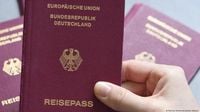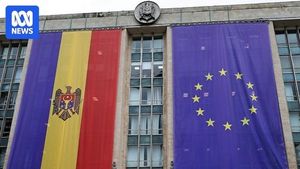The ongoing coalition negotiations between the conservatives of the Christian Democratic Union and Christian Social Union (CDU/CSU) and the center-left Social Democratic Party (SPD) have been marked by intense discussions, sometimes leading to heated arguments and even slammed doors, according to information leaked to the press by participants. The working group focused on immigration and integration issues has faced extreme differences, yet a draft paper intended as the basis for the coalition agreement has been produced and reviewed by DW.
Under the heading "Citizenship law," the paper states: "We are committed to the reform of citizenship law." It continues, "We will examine under constitutional law whether we can revoke the German citizenship of terror supporters, antisemites, and extremists who call for the abolition of the free and democratic basic order, if they hold another nationality." SPD politician Dirk Wiese, who was part of the working group responsible for "Domestic Affairs, Law, Migration and Integration," touted this as a significant success for his party.
Wiese told DW that the SPD had ensured the possibility of dual citizenship remained, with naturalization possible after five years, or three years with language proficiency. The CDU/CSU's more far-reaching proposal to withdraw German citizenship from dual nationals under certain circumstances faced resistance from the SPD. Some Social Democrats worry that the proposal will lead to unequal treatment, questioning whether naturalization would merely serve as a probationary period. Bremen Mayor Andreas Bovenschulte raised concerns about the message conveyed to the five million people living in Germany with dual nationalities, suggesting it implies their citizenship is worth less.
Abdel, a pseudonym for a German-Palestinian who also holds Jordanian citizenship, expressed his anxiety about the situation, noting, "The situation is very tense. It could become unpleasant for people like me." Clara Bünger, a member of the Bundestag for the Left Party, criticized the proposal as a "two-class citizenship law," emphasizing the need for clear rules and legal certainty for all individuals in Germany.
Germany's Basic Law stipulates that the state may not withdraw citizenship, with exceptions for individuals fighting for terrorist organizations like the Islamic State, but only if they possess a second passport. During the recent federal election campaign, the CDU/CSU repeatedly called for tightening regulations. Chancellor candidate Friedrich Merz announced in January 2025 that "people who commit crimes and have dual citizenship" would face deportation, while CSU leader Markus Söder wrote on X: "Anyone calling for a caliphate must be stripped of dual citizenship!"
The current draft proposal aims to target "terrorist supporters" or "antisemites." However, critics point out that antisemitism is not a standalone criminal offense in Germany; it must fulfill the criteria of incitement to hatred. Elad Lapidot, a professor of Jewish studies, expressed concern over the plans of Germany's likely next government, particularly regarding the definition of antisemitism. The Bundestag has reaffirmed the working definition of antisemitism by the International Holocaust Remembrance Alliance (IHRA) as its benchmark, which includes broad interpretations that could potentially impact many individuals.
Lapidot, who holds both German and Israeli citizenship, is especially worried given his family's history of being stripped of their German citizenship under Nazi-era law. He stated, "Germany already created second-class citizens at one time," and he fears that current proposals may lead to similar injustices. He added, "Portraying antisemitism as imported by Arabs, Palestinians, and Muslims is cynical and extremely disturbing. Antisemitism became a genocidal ideology in Germany, and it has never disappeared from its society."
Left Party politician Bünger believes the exploratory paper reflects the influence of the far-right Alternative for Germany (AfD), stating that pressure from the right has made these stringent policies possible. Meanwhile, Abdel is contemplating relinquishing his Jordanian citizenship to avoid losing his German citizenship, asserting, "I know I'm not an antisemite. A revocation of my citizenship would be nothing more than a means of suppressing freedom of expression."
As the coalition negotiations continue, the draft paper remains subject to constitutional review. Felix Klein, the federal government's antisemitism commissioner, declined to comment on the draft coalition paper, citing its unfinished status. Wiese expressed optimism that the text would not withstand legal scrutiny, although those potentially affected by the proposed regulations remain anxious about their future.
In another realm of German politics, services union Verdi is set to meet for a fourth round of talks on April 5, 2025, to negotiate public sector pay and conditions. Representing around 2.5 million public-sector workers, Verdi has been engaged in discussions with local and federal government officials, punctuated by regular warning strikes across various sectors, including refuse collection, clinics, and public transport.
After enlisting arbitrators on March 17, 2025, recommendations were issued for a three percent pay rise effective April 1, 2025, with an additional 2.8 percent increase projected for May 2026. All employees are expected to receive an extra day's holiday starting in 2027. The negotiating parties have remained tight-lipped regarding these proposals, which will be the focus of the upcoming talks in Potsdam.
Meanwhile, the Interior Ministry announced significant progress in limiting irregular immigration, noting a 43 percent decrease in asylum applications during the first two months of 2025 compared to the previous year. The number of deportations has also risen consistently, exceeding 20,000 in the last year. The CDU/CSU's Friedrich Merz promised a radical crackdown on migration during his campaign, proposing to turn away all undocumented foreigners at the border.
Germany has tightened border checks since 2015, initially along its border with Austria and later extending to borders with Poland, the Czech Republic, and Switzerland. Since September 2024, controls have been applied at all land borders, including those with France, Luxembourg, Belgium, the Netherlands, and Denmark.
In a separate development, the European Parliament lifted the immunity of German far-right lawmaker Petr Bystron, who faces prosecution for sharing a controversial photo montage resembling a Nazi salute. Bystron, a member of the AfD, was previously a lawmaker in the Bundestag before being elected to the European Parliament in 2024.
On the international front, Foreign Minister Annalena Baerbock accused Russian President Vladimir Putin of stalling negotiations to end the conflict in Ukraine during her recent visit to Kyiv. Baerbock emphasized that true peace can only be achieved when Putin realizes he cannot win the war.
Lastly, Berlin authorities are reportedly pushing to deport four young foreign residents due to their involvement in pro-Palestine protests. Critics argue that these actions may be politically motivated rather than based on serious criminal charges, drawing parallels to past deportation practices aimed at suppressing social movements.





